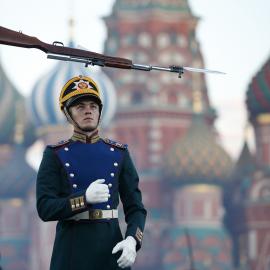Even with all its reservations and caveats, Robert Crews’ essay (“Moscow and the Mosque,” March/April 2014) still presents an assessment of Muslims in Russia that is rosier than reality. The most important part of the story today is not the maneuvering of Russian President Vladimir Putin vis-à-vis Muslim clerics but rather the rising tensions between the country’s two largest religious communities.
One source of conflict that Crews does not mention centers on the construction of religious buildings. From Moscow to the western city of Kazan, non-Muslim Russians are growing increasingly resentful of what they consider expansive Islamic religious building programs. The Orthodox Church, meanwhile, has expanded rapidly and aggressively, with the full support of the state, and often its financial support as well. In Moscow, the Orthodox patriarchate recently announced plans to build hundreds more churches, whereas in several instances, the building of new mosques has been prohibited -- in spite of the city’s growing Muslim population.
Another source of tension is the increasing prevalence of Muslim religious festivals being celebrated out in the open, such as the holiday of Kurban Bayrami, when multitudes of the faithful flow into the streets and proceed to publicly slaughter, cook, and feast on lambs. In Moscow, owing to the shortage of mosques and special religious housing, Muslims celebrate even more of these festivals in the open air, generating anger among non-Muslim residents. Moscow’s Muslims have also faced difficulty exercising their political rights in public. Just recently, city authorities denied a request by Muslim community leaders to hold a rally protesting Islamophobia and the harassment of Muslims.
Meanwhile, the Russian state’s ongoing effort to privilege the Orthodox Church continues to annoy Islamic leaders. For example, an attempt has already been made in the Duma, the lower house of Russia’s parliament, to introduce a constitutional provision declaring Russian Orthodoxy the official state religion, which is already the de facto state of affairs. In Kazan, there are signs of public unrest. The city recently witnessed a series of incendiary attacks by young Muslims on church buildings. This sort of thing is not publicized in Russia’s state media -- nor mentioned by Crews -- but one can find reports of these episodes on the Internet. And the Salafists whom Crews argues are “distributed in small pockets throughout the country” may not be as apolitical as he suggests. Although there are currently few terrorists in Russia from outside the Caucasus, that might not be true for long.
Crews does make one factual error, claiming that “many Russians suspect, with good reason, that the Federal Security Service had a hand in” the terrorist attack on the Dubrovka Theater in 2002. Even Putin’s worst enemies (with the possible exception of a few fanatics) have never made such an accusation.
What Crews says at the end of his piece, however, is correct: irrespective of Putin, Russia’s Muslims will ultimately determine their own future. It remains unclear how firmly Russian leaders will stand in their way.
VASILY RUDICH
New Haven, Connecticut
